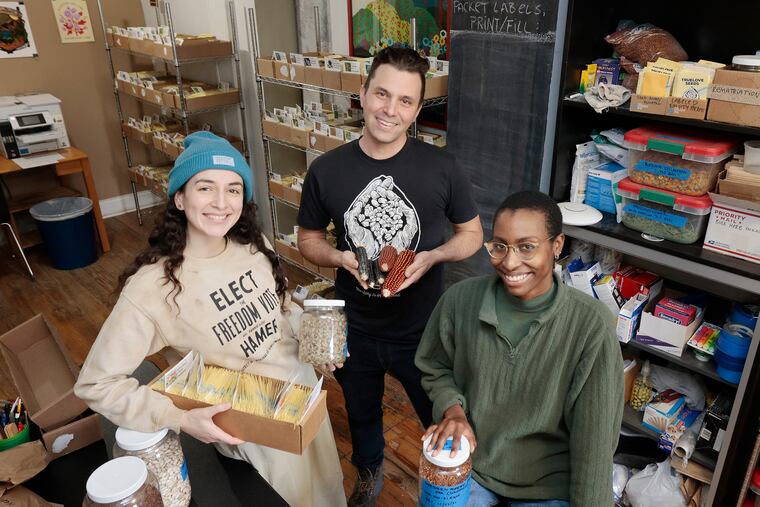Saving and replanting seeds can expand gardens and preserve cultural crops
Seed keeping and gardening have taken off during COVID-19, fueled by boredom, food security anxiety, or surging interest in a sustainable lifestyle.

Whenever Martin Fuchs eats sushi, he savors shishito peppers, a salty and sweet finger food. After he found shishito plants at a garden center, he grew some, saved 30 seeds, and planted them the following spring.
But those pepper plants failed to sprout. Harvested before the pepper pods turned bright red and truly ripe, Fuchs’ immature shishito seeds could not grow into plants.
Still, Fuchs was following an instinct as old as man: Discover a tasty plant. Save the seeds. Try to grow.
Five years later, Fuchs’ Upper Moreland basement boasts a pepper bounty. The Jimmy Nardello long hots, the pepperoncinis, the shishito, and more already stand a half-inch tall beneath hanging lights. Success came step by step, he said, from advice he found online, in such Facebook groups as Pennsylvania Gardeners, and the Seed Savers Exchange.
“You learn one thing. You grow. You learn another. It’s all about patience,” Fuchs said. “This year, I think I am going to need another raised bed in the backyard.”
Seed keeping and gardening have taken off during COVID-19, experts say, fueled by boredom, food security anxiety, or surging interest in a sustainable lifestyle.
“The pandemic changed everything for the seed world,” said Owen Taylor, a Philadelphia food activist and recent cofounder of Truelove Seeds. “We went from a baby seed company to sales skyrocketing off the charts.”
» READ MORE: Uprooted gardeners can find joy starting over at a new home
Seed swappers seek tips, discover new seeds, and find support in online forums and this year, at in-person swaps, which are becoming more readily available as pandemic lockdowns relax. At a swap, gardeners offer or trade leftover seed packets and seeds they have saved themselves.
Besides food sovereignty, seed-saving preserves cultural foodways and memories of gardening elders, Taylor said. The Kensington-based Truelove Seeds also cultivates community by selling stock nurtured by about 50 local growers.
Seed Saving Tips
- Wait until produce is fully ripened before harvest.
- Gently extract seeds and tease them apart for drying.
- Spread seeds on a paper plate, paper towel, or coffee filter.
- Allow for seeds to dry in a well-ventilated spot, away from direct sun.
- Once completely dry, store seeds in an airtight container in a cool dark place.
- Ask for help online in gardening forums. This can be beneficial as certain techniques apply for different produce, such as tomatoes.
- You can also store seeds in the refrigerator or freezer.
Taylor is helping revive the tradition of sharing seeds in person. On Feb. 22, he is looking forward to a seed exchange and storytelling workshop, sponsored in part by the nonprofit Philadelphia Seed Exchange. Trades will include seeds from Vietnamese bitter melon, Caribbean amaranth, and Filipino peppers.
“I love hearing people talk about this very private work they do in the garden and their joy through these little packets of life,” Taylor said.
Preserving and sharing heirloom seeds is also the work of institutions, such as the Roughwood Seed Collection, based in Devon. Its repository of an estimated 4,000 varieties includes the fish pepper grown by Horace Pippin, a Chester County folk art painter who died in 1946.
Nate Kleinman, a South Jersey grower and cofounder of the Experimental Farm Network, also discovers and shares different cultural foods through seeds. To a recent interview, he brought hand-labeled sandwich bags containing seeds from Guatemalan green-fleshed ayote squash, Sri Lankan eggplant, rhubarb from his farm in upstate New York, and a recent find: wild Russian strawberries.
The tiny deep-purple strawberry seeds came from the frozen food section of a Russian supermarket in Northeast Philadelphia. He thawed the berries, strained the pulp through a sieve, and let the seeds dry on paper coffee filters in a cool, dry spot in his house.
With the practiced eye of a forager, Kleinman also roams the land to harvest seeds for hardy, perennial, native, and nutritious crops that advance sustainable agriculture practices. As a young farmer in Elmer, Salem County, Kleinman discovered what’s now shared as Deitrich’s wild broccoli raab, a dark, stout relative of the turnip green growing alongside his furrows nearly year-round.
“It is the earliest green vegetable we are eating weeks before the first asparagus come up,” Kleinman said. “It grows into the fall, and even when it is really cold, the rosette in the middle of the crown is still alive.”
Seed swapping events
First Annual Seed Swap
Saturday, Feb. 12, 1:30-3:30 p.m.
Evansburg United Methodist Church, 3871 Germantown Pike, Collegeville, Pa. 19426
$1 donation requested. You do not need to bring seed to receive seeds.
Organized by the Facebook group Pennsylvania Gardeners. Chelsea Brown, organizer, 484-401-8729
Storytelling and Seed Exchange Workshop
Tuesday, Feb. 22, 4-6 p.m.
Asian Arts Initiative, 1219 Vine St., Philadelphia, Pa. 19107
Register at asianartsphilly.ticketleap.com
Proof of vaccination or negative COVID-19 test required
Sponsored by Truelove Seeds, Chronicling Resistance, Bahay215, Land Based Jawns, the Philadelphia Seed Exchange, and the Free Library Philadelphia. Special focus on plants from Africa, Asia, and the Caribbean. 215-557-0455